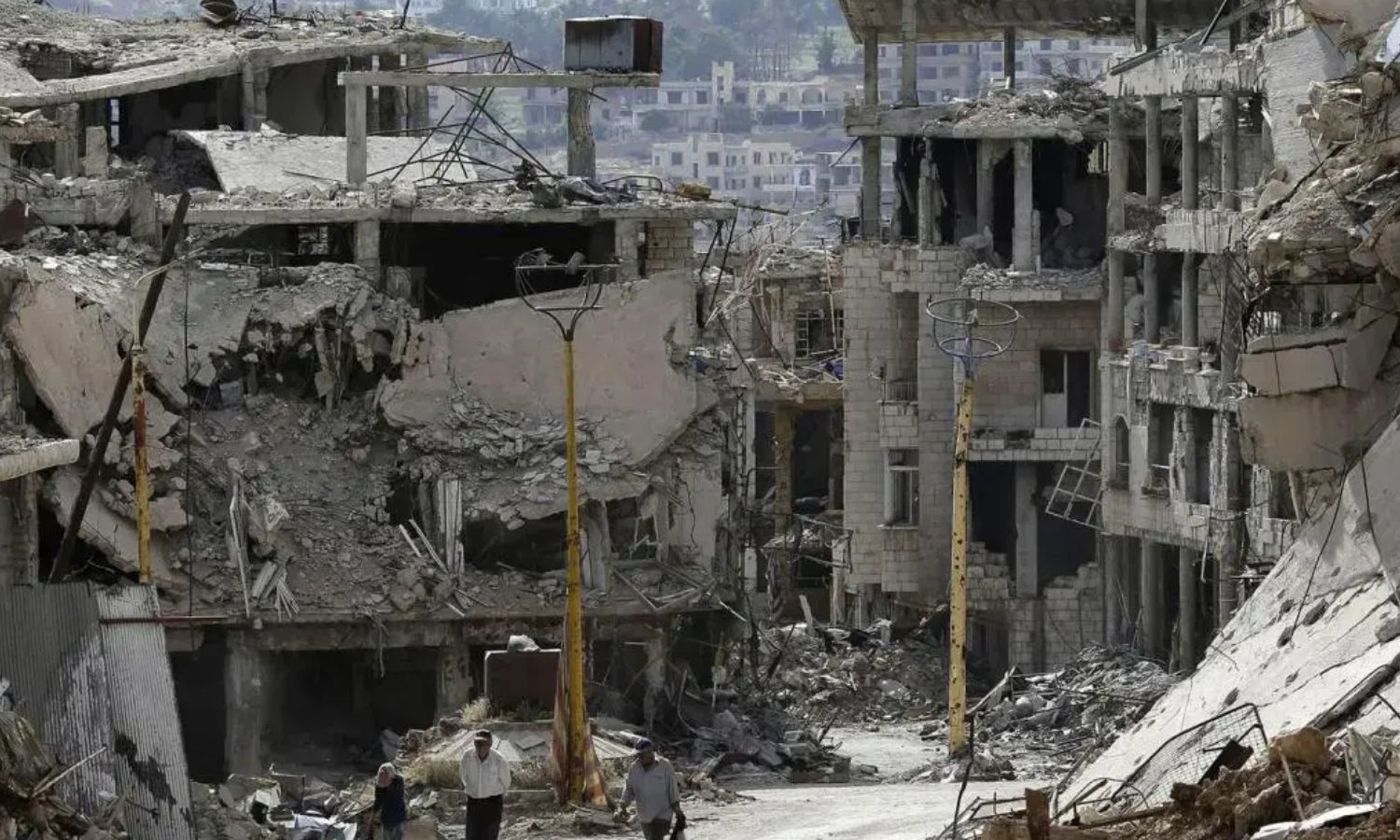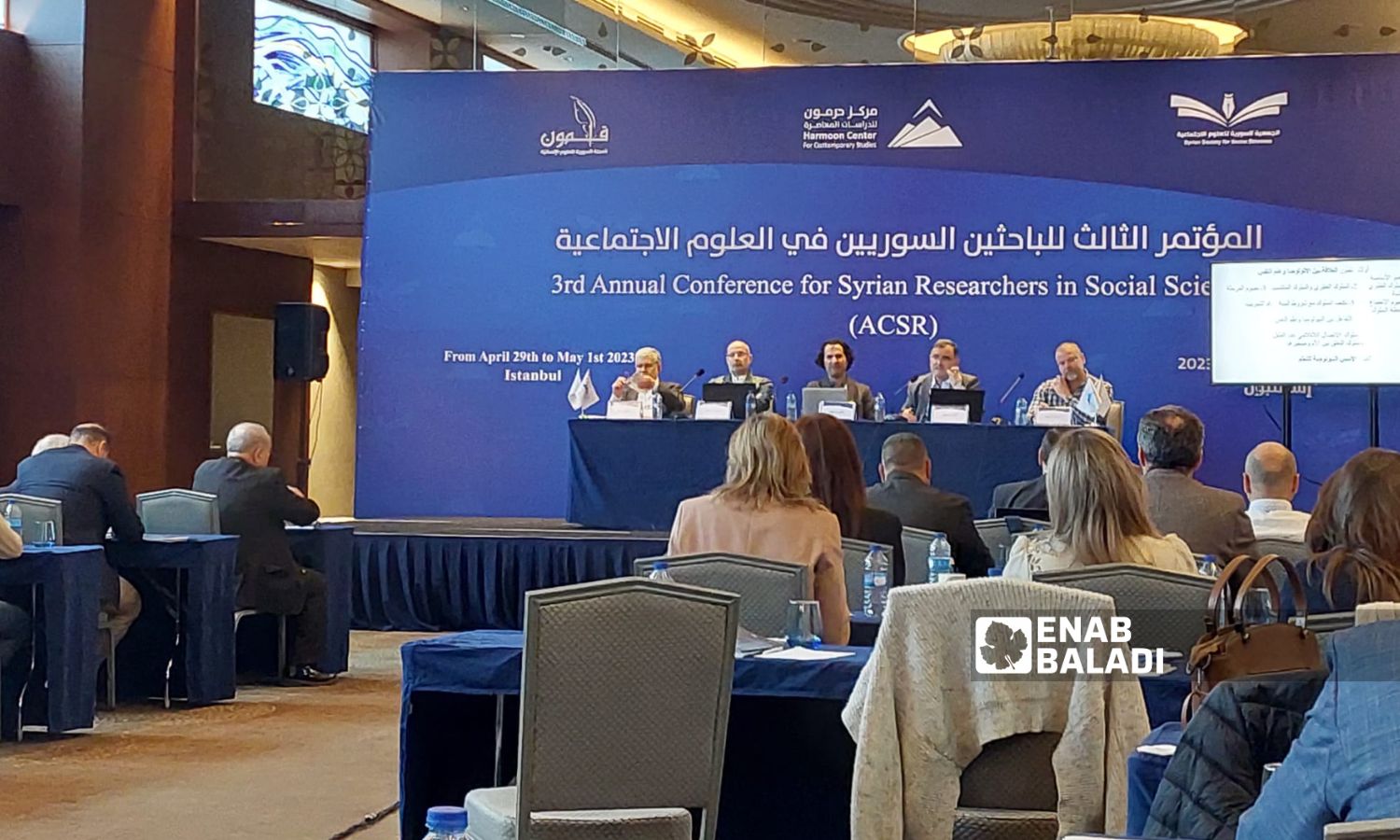



Enab Baladi – Jana al-Issa
The reconstruction of Syria is one of the most important economic files that are being talked about, and it is one of the very difficult challenges in the event that Syria exits from the war stage to the political transition and then reconstruction.
The reconstruction file is considered rich because of the great gains and interests it entails for the parties that will be involved in it, which makes it a competitive means to control the reconstruction and, among other things, the country’s economic future.
Within the third conference of Syrian researchers in social sciences at the end of April, which was attended by Enab Baladi, Younis al-Karim, a researcher in economic affairs and executive director of the “Iqtisadi” platform, discussed a research study entitled “Reconstruction and the Role of Warlords (Criminal Entrepreneurs).”
Through previous experiences, such as the Russian, Iraqi, and Lebanese experiences, the researcher considered that the file of reconstruction in a country that has lived through war for many years is often handled by the war heroes themselves.
They turn out to play a prominent role as peacemakers, given that they possess the masses, the national legitimacy, and even the international relations that make it difficult to challenge them or question their capabilities.
The researcher considered that the war criminal is “who is strong when the state is weak,” explaining that the problem of the study lies in the fact that warlords have great influence in the Syrian reality, whether loyal to the regime or the opposition, or another party that calls itself third parties, what is meant by civil society, wondering about the extent of the latter’s future role in the reconstruction file and its impact on that file.

The third conference of Syrian researchers in the social sciences – May 1, 2023 (Enab Baladi/Jana al-Issa)
“No matter how much we try to neutralize the warlords and say in advance that they will have no role and influence in the peace phase, we do not see the truth. The warlords will have a political and economic role in the post-war phase, which will result in a fragile situation for peace,” al-Karim told Enab Baladi on the sidelines of the conference organized by Harmoon Center for Contemporary Studies.
Regarding the importance of the research, the economist explained that it is important to reach several results, represented by the method of reducing the role of warlords during the reconstruction phase and how to launch the process towards reconstruction and then development.
In addition to learning about the causes of corruption at this stage and the mechanisms of its formation, how to divide roles and stages of reconstruction, identifying funding sources, and overcoming difficulties, in addition to highlighting the rebuilding of state institutions away from corruption and nepotism.
A report issued by the Syrian Legal Development Program in 2019 highlighted business-related activities that may contribute to international crimes and human rights violations in Syria.
The in-depth report showed that a number of international players may have participated in the commission of international crimes and human rights violations in Syria, including companies owned by the regime, business elites and multinational companies that have partnerships with these elites, and companies that are owned by or associated with the governments of Russia and Iran.
Also, companies that intend to invest in Syria during the reconstruction process may find themselves involved in human rights violations and international crimes committed by the Syrian regime and its allies, according to the report.
Reconstruction is mainly linked to the political transition, of which there are no close indications during the current stage at least, which makes talking about the mechanism or roles of people and governments in the reconstruction phase far from reality, according to what many Syrian experts believe.
On the other hand, al-Karim does not agree with this proposition, considering that it is not a classic proposition at all, but rather it is one of the most important economic issues that must be talked about now and planned to ensure benefiting from the experiences of previous countries in this field.
The scholar justified this proposition at this time by attempts to impose peace, with the survival of the existing parties, and to keep the situation as it is without deterioration or progress for the better, and here it is feared that the reconstruction file will turn into a “consolation prize” for these various parties in exchange for their guarantee not to enter into the conflict from new.
What encourages talking about the file, and the need to draw its policies from now, is the confusion between reconstruction and early recovery, considering that marketing for early recovery constitutes an implicit recognition of satisfaction with the current political situation and, therefore, not seeking to change it.
The United Nations Development Office (UNDP) defines Early Recovery as “an approach that addresses recovery needs that arise during the humanitarian phase of an emergency, using humanitarian mechanisms that align with development principles. It enables people to use the benefits of humanitarian action to seize development opportunities, build resilience, and establish a sustainable recovery process from a crisis.”
Three differences between early recovery and reconstruction:
- Reconstruction plans are drawn up and implemented by the state, while early recovery is planned and implemented by relief organizations, whether centralized under the command of a single administrative body such as the United Nations or by individual organizations.
- Early recovery is a form of humanitarian assistance, while reconstruction is not, as reconstruction can come in the form of soft loans from single or multilateral organizations such as the Monetary Fund or the World Bank. As for early recovery, it is only a type of humanitarian assistance that No later payment is required.
- Early recovery priorities are based on humanitarian needs, as is the case with other forms of humanitarian assistance. Reconstruction is not necessarily the case.
Source: Operations and Policy Center (OPC)
The responsibility for establishing the stage of reconstruction after the political transition rests with the transitional government, as this stage does not require making major decisions towards the economic system but rather requires a contribution to laying the foundations for the second stage.
The government must establish a stage of reconstruction according to a specific time, relying on funding from three sources, which are the remnants of donations and aid, soft loans, and finally through warlords, with the need to prevent their further incursion through the presence of specialized economic courts, according to al-Karim.
At the start of the reconstruction phase, the most important decisions are taken about the form of the ruling economic system that will build state institutions and determine the mechanisms for disposing of financing.
The research study prepared by al-Karim concluded with several recommendations, including:
According to a joint report prepared by the United Nations Economic and Social Commission for Western Asia (ESCWA) and the Center for Syrian Studies at the University of St. Andrews in September 2020, Syria incurred economic losses estimated at $442 billion over eight years, due to a war that “destroyed everything and which cost the country its hard-won social and economic gains.”
if you think the article contain wrong information or you have additional details Send Correction